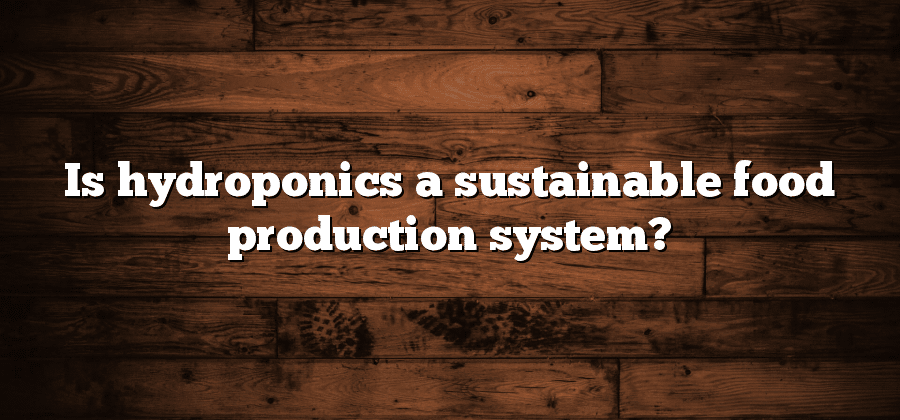Benefits of hydroponics for food production
Hydroponics, an innovative approach to food production, offers several benefits that contribute to the sustainable production of fresh and nutritious crops. Firstly, hydroponic systems allow for year-round cultivation, eliminating the limitations associated with seasonal changes and unpredictable weather conditions. By providing controlled environments, hydroponics enables producers to optimize crop growth and yield, ensuring a steady and reliable supply of fresh produce.
Moreover, hydroponics minimizes the need for space, making it an ideal solution for urban and limited areas. By growing plants vertically or in stacked layers, farmers can maximize the use of available space, efficiently utilizing rooftops, balconies, or even indoor areas. This spatial advantage not only increases the potential for food production in densely populated regions but also reduces the reliance on traditional farms located far from urban centers. As a result, transportation costs and energy consumption are significantly reduced, contributing to a more sustainable and environmentally friendly food production system.
Limitations of hydroponics as a sustainable system
Hydroponics, a soil-less method of growing plants, has gained popularity in recent years for its potential to revolutionize food production. However, like any agricultural system, it comes with its limitations as a sustainable solution for long-term food production. One major limitation is the reliance on artificial systems to provide the necessary nutrients and water for plant growth.
In a traditional soil-based system, nutrients are naturally present in the soil and can be replenished through organic matter. In hydroponics, however, nutrients must be supplied through nutrient-rich solutions. This dependence on synthetic nutrients raises concerns about the sustainability of hydroponics, as it requires energy-intensive processes for nutrient production and distribution. Additionally, these synthetic nutrients can have negative environmental impacts, such as the leaching of excess nutrients into water bodies, leading to water pollution.
Another limitation of hydroponics as a sustainable system is the need for a stable energy supply to power the artificial lighting and ventilation systems. To mimic the natural light conditions required for plant growth, hydroponic systems often rely on high-intensity artificial lighting, which consumes significant amounts of energy. Additionally, maintaining the optimal temperature and humidity levels in indoor hydroponic facilities demands constant ventilation and climate control, further contributing to energy consumption. This reliance on non-renewable energy sources raises concerns about the overall sustainability of hydroponic systems in the long run.
Environmental impact of hydroponics
Hydroponics, as an innovative method of food production, has gained attention in recent years due to its potential to address various environmental concerns associated with traditional farming practices. One of the noteworthy benefits of hydroponics is its minimal impact on land use. Unlike traditional farming, hydroponics does not require vast expanses of land for cultivation. Instead, it utilizes vertical farming techniques, allowing for high-density planting in limited spaces. This not only preserves precious agricultural land but also reduces deforestation and habitat destruction, making hydroponics a more eco-friendly option.
Furthermore, hydroponics has the potential to significantly decrease the use of harmful chemicals and pesticides that are commonly employed in traditional farming methods. In hydroponic systems, plants are grown in a soil-less environment, which eliminates the need for pesticide application. Additionally, the controlled environment of hydroponics limits the growth of weeds, further minimizing the use of herbicides. As a result, hydroponics presents a more sustainable approach to food production that reduces chemical pollution and maintains the ecological balance in surrounding ecosystems.
Water usage in hydroponics compared to traditional farming
Water usage is a critical factor in the agricultural sector, and finding sustainable and efficient irrigation methods is essential for both traditional and hydroponic farming systems. When comparing water usage between hydroponics and traditional farming, it becomes evident that hydroponics has the potential to significantly reduce water consumption.
In traditional farming, water is often applied to plants through methods such as flood irrigation or overhead sprinklers. These methods can lead to significant water loss due to evaporation, surface runoff, and inefficient absorption by plant roots. Additionally, large quantities of water are needed to maintain soil moisture levels, especially in arid regions.
On the other hand, hydroponics allows for precise control of water usage. The root systems of plants are submerged in nutrient-rich water solutions, which are continuously recirculated. This closed-loop system minimizes water loss and eliminates the need for excess water to compensate for evaporation or runoff. Furthermore, water uptake in hydroponics is optimized, as the plants can directly absorb nutrients dissolved in the water, resulting in more efficient water usage overall.
Efficiency and productivity of hydroponics
Hydroponics offers significant advantages when it comes to efficiency and productivity in food production. With this system, plants are grown in water-based solutions infused with essential nutrients. This eliminates the need for soil, reducing the risk of pests, diseases, and weeds. As a result, plants can grow faster and healthier, leading to higher yields compared to traditional farming methods.
One of the main reasons for the increased efficiency of hydroponics is that the plants receive an optimal balance of nutrients directly to their roots. This eliminates nutrient competition among plants and ensures that each one receives the exact amount of nourishment it needs to thrive. Additionally, hydroponics allows for greater control over environmental factors such as temperature, lighting, and pH levels. This precision creates ideal growing conditions, enabling plants to reach maturity quicker and produce a greater quantity of high-quality crops.






